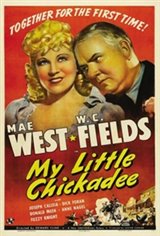
My Little Chickadee
My Little Chickadee
The once-in-a-lifetime teaming of Mae West and W.C. Fields in My Little Chickadee had the potential for comic greatness: what emerged, though generally entertaining, was, in the words of critic Andrew Sarris, more funny strange than funny ha-ha. Mae West dominates the film's first reel as Flowerbelle Lee, a self-reliant woman who is abducted by a mysterious masked bandit during a stagecoach holdup. Because she refuses to tell anyone what happened during her nocturnal rendezvous with the bandit, Flowerbelle is invited to leave her prudish hometown and move to Greasewood City. En route by train, Flowerbelle makes the acquaintance of con-artist Cuthbert J. Twillie (W.C. Fields), who carries a suitcase full of what seems to be large-denomination monetary notes. After a lively clash with marauding Indians, Flowerbelle tricks Twillie into a phony marriage; she does this so that she can arrive in Greasewood City with a modicum of respectability, and incidentally to get her hands on Twillie's bankroll. Once she discovers that Twillie's fortune consists of nothing but phony oil-well coupons, Flowerbelle refuses to allow Twillie into the bridal chamber (he unwittingly crawls into the marriage bed with a goat, muttering Darling, have you changed your perfume?) Through a fluke, the cowardly Twillie is appointed sheriff of Greasewood City by town boss Joseph Calleila. The plot is put on hold for two reels while La West does a schoolroom routine with a class full of markedly overage students, and while Fields performs a bartender bit wherein he explains how he once knocked down the notorious Chicago Mollie. Jealous over the attentions paid to his wife by Calleila and honest newspaper-editor Dick Foran, Twillie decides to gain entry into his wife's boudoir by posing as the still-at-large masked bandit. His ruse is soon discovered by Flowerbelle, but the townsfolk capture Twillie as he makes his escape. They are about to lynch the hapless Twillie when Flowerbelle discovers that Calleia is the genuine masked bandit. She urges Calleia to save Twillie's life by making a surprise appearance at the lynching and by returning the money he's stolen. When all plot lines are ironed out, Flowerbelle and Twillie bid goodbye to one another. Borrowing a device utilized by ZaSu Pitts and Hugh Herbert in 1939's The Lady's From Kentucky, W.C. Fields invites Mae West to come up and see me sometime, whereupon West appropriates Fields' tagline and calls him My Little Chickadee. The script for this uneven comedy western was credited to Mae West and W.C. Fields, though in fact West was responsible for most of it. Fields willingly conceded this, noting that West had captured his character better than any other writer he'd ever met. Despite this seeming gallantry, it was no secret that West and Fields disliked each other intensely, a fact that had an injurious effect on their scenes together. My Little Chickadee has assumed legendary status thanks to its stars, and it certainly does deliver the laughs when necessary: still, it is hardly the best-ever vehicle for either Fields or West, two uniquely individual performers who should never have been required to duke it out for the same spotlight.
| Cast: | Mae West, George Moran, Si Jenks, Gene Austin |
| Producer(s): | Lester Cowan, Jack Gross |
